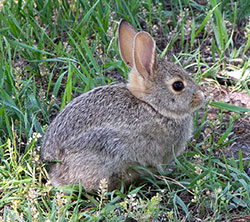Rabbits often ravish trees and shrubs in many Front Range gardens during the winter. The deep snow covers normal food sources and provides a platform for rabbits to reach the bark high on woody plants.
How can I prevent bunnies from coming into my yard?
Win the bunny battle by excluding them from desirable plants. Place chicken wire or rigid polypropylene plastic tubes around tree trunks and stems of shrubs. Bury chicken wire at least six inches deep to prevent rabbits from digging and chewing below the tubes. The wire must have holes smaller than a rabbit head because they will squeeze through small spaces.
What repellents can be used against bunnies?
Divert rabbits by spraying plants with repellents. Effective products contain one of the following active ingredients: capsaicin (pepper extract), castor oil, ammonium salts, or predator urine. Chicken egg repellents, sold under a variety of trade names, also can be effective.
Spray plants to a height of 3 feet. Applications must be repeated after rain or irrigation to be effective.
What plants will not attract bunnies?
Check with your local CSU Extension Office for a list of rabbit resistant plants. Plants such as daffodils, sedum, foxglove, iris, lambs ear, monkshood, oriental poppy, red hot poker, yarrow, yucca, apache plume, and blue mist spirea are considered rabbit resistant to some degree. Note that rabbits have taste preferences. Management methods that work in one location may prove ineffective in another.
For a list of deer resistant plants, refer to script number 2302.



